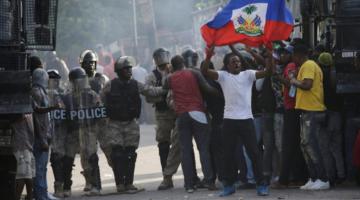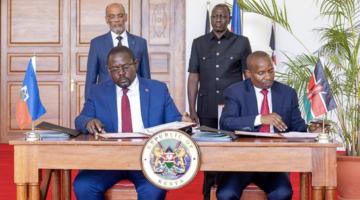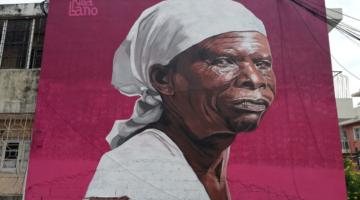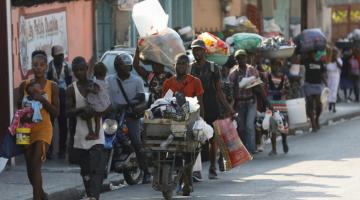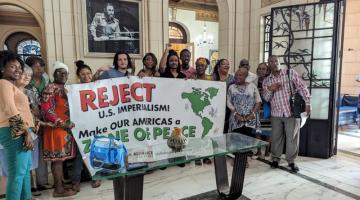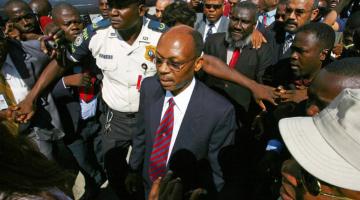Remembering France’s odious participation in the 2004 coup d’etat in Haiti.
February 29, 2004 marks the twentieth anniversary of the coup d’etat in Haiti, sponsored by the US, Canada, and France. Haiti’s president, Jean-Bertrand Aristide, was removed–”kidnapped” is a better word–from his country by US marines and flown to the Central African Republic. The US and other western countries claimed that Aristide had resigned on his own volition, and that the crisis that engulfed the country (including attacks by a small group of well-armed paramilitaries) was a homegrown affair. Yet it did not take long for the truth to come out: the 2004 coup d’etat was initiated at the 2003 “Ottawa Initiative on Haiti,” where the Liberal government in Canada convened a meeting with representatives from the US, Europe, and Latin American countries to decide how to conduct regime change in Haiti.
Indeed, the removal of Aristide from power was the culmination of a clear, concerted, and successful campaign, one that included the collusion of European, Latin American, and North American states and the marshaling of myths of “international law” and the “international community” to sanction this illegal act. From his election in 2000 to the eve of the coup in 2004, Aristide’s government was under a lot of stress. The US established an unannounced but illegal embargo that decimated the country’s economy; the US, France, Canada, and the Dominican Republic trained paramilitary groups to threaten and terrorize the population; and the western media helped in the propaganda war Aristide.
While the U.S. was at the forefront of the 2004 coup, France played an especially dubious and nasty role. Indeed, on February 25, 2004 – four days before the actual coup – Dominique Villepin, France’s Minister of Foreign Affairs, wrote to the United Nations Security Council, detailing a plan for the upcoming regime change and UN occupation of Haiti. In his statement, Villepin tells the UN to prepare for “the immediate establishment of a civilian peacekeeping force” as well as for the establishment of an electoral commission for a presidential election in Haiti.”
The brazenness and callousness of Villepin’s demands should be shocking as Haiti had a democratically elected president who still had months in his term left over. The fact that Villepin’s statement was sent four days before the coup demonstrates that the coup was not a spontaneous action. Rather, the white imperial powers had been meticulously planning both the coup and the participation (however unwitting) of the “international community.” The historical echoes of Villepin’s statement should also be noted. Villepin reprises the racist and paternalistic calls for foreign intervention and occupation of Haiti outlined in the notorious “Farnham Plan.” The Farnham Plan was outlined in a January, 1914 memo sent by National City Bank vice president Roger L. Farnham to US Secretary of State William Jennings Bryan calling for the landing of US marines troops in Haiti. The Farnham Plan provided the blueprint for the first occupation of Haiti (1915-1934). Meanwhile, the language of the Villepin statement is replicated today in the language and rhetoric demanding foreign intervention (this time “led” by Kenya and with the collusion of Caricom and others) to handle Haiti’s “gang problem.”
Why was France so interested in Haiti? One reason was Aristide’s call, in 2003, for $21 billion in reparations from France for the 1825 indemnity charged to Haitians to compensate white French slave owners who lost their property in Africans during the Haitian Revolution. France never recovered from its military defeat by the Haitian people and its elites sought to make Haiti pay. Another reason is France’s long standing imperial policy in the African world, a policy that has long helped to prop up the French economy. France has had a neocolonial death grip on its former African colonies, maintained through a history of assassinating African leaders and the staging of coup d’etats throughout the continent.
We reprint the Villepin statement below. It provides conclusive evidence of the clear role of France in the coup d’etat against Haiti. It demonstrates precisely how bold and brazen the white west is when it comes to its illegal and unethical dealings with our people. And it shows that when it comes to dealing with Haiti and the Black world, there is an unbroken and continuous history of deadly racism. That illegality, those unethical dealings, and that deep racism all continue today.
Statement by the Minister for Foreign Affairs of France, Dominique de Villepin, on the situation in Haiti, 25 February 2004
The situation in Haiti is continuing to deteriorate. A race in under way between those who support violence and those who are still hoping for a peaceful solution. Haiti is now threatened with chaos. It is the duty of the international community to assume its responsibility to preserve the country from disorder and violence. I have spoken several times yesterday and today with Colin Powell, other foreign colleagues and several Haitian political leaders. I will in theory be meeting with representatives of the two parties in Paris this Friday. The path we tread is a narrow one, for we must take into account both democratic and constitutional principles, refusing to let force have the last word and facing reality such as it is: the regime has reached an impasse and has already departed from constitutional legality. What, in this context, should be the objective of the international community? A political solution must be defined that brings together all those forces in the country that refuse to return to its darkest hours.
To achieve this, the best formula remains the establishment of a transitional Government of national unity presided over by a prime minister designated according to the CARICOM plan. But to break the current impasse, the political process must be revived with an accelerated timetable: that is why, if this transition Government, representing a large national majority, should decide to proceed with the required elections before the summer, France will provide the necessary support. France is prepared to play a full role in the international mobilization effort. To that end, it proposes an initiative that broadens the CARICOM plan. The initiative would be structured around the following points:
- The immediate establishment of a civilian peacekeeping force. This international force would be responsible for guaranteeing the return to public order and supporting the international community’s action on the ground. It would provide support for a Government of national unity
- International assistance for preparing the presidential election by establishing an electoral commission, instituting legitimate voter registration rolls and organizing international observer missions
- The delivery of international humanitarian aid
- The dispatch of human rights observers
- A long-term commitment to providing international aid for the economic and social reconstruction of the country
All of the above must be legitimized and implemented by the international community.
- Our proposals could be submitted to the OAS and CARICOM and the plan, thus strengthened, could be conveyed to the United Nations for adoption by the Security Council.
- It would then be up to the Secretary-General of the United Nations to appoint a special representative who would be in charge of implementing the plan on the ground and, more particularly, coordinating among the various organizations that would be induced to intervene, such as the Red Cross, the Commission on Human Rights and NGOs.
- This international mobilization could involve regional organizations (OAS, CARICOM) as well as the various United Nations bodies and the European Union.
While there is not yet reason to lose hope, the threat of growing violence in Haiti today is real. Too much blood has already spilled, however, and we must interrupt this spiral. That is why France is calling on everyone to respond urgently:
- The churches have an important role to play, and we invite them to renew their efforts.
- The political opposition must open a new phase of negotiations.
- As for President Aristide, he bears heavy responsibility for the current situation. It is up to him to accept the consequences while respecting the rule of law. It is his decision; it is his responsibility. Everyone can clearly see that a new page must be turned over in Haiti’s history, while the dignity and integrity of all the protagonists must be respected.
Statement by the Minister for Foreign Affairs of France, Dominique de Villepin, on the situation in Haiti, 25 February 2004. United Nations Digital Library.



